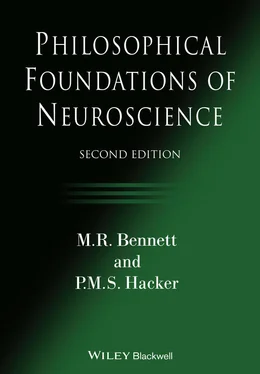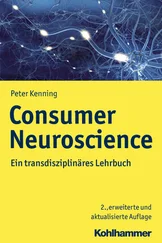Searle suggested that if ascribing psychological attributes to the brain really were a mereological error, then it would vanish if one ascribed them ‘to the rest of the system’ to which the brain belongs. The ‘rest of the system’, he held, is the body that a human being has . He observed that we do not ascribe psychological attributes to our body. With the striking exception of verbs of sensation (e.g. ‘My body aches//itches//hurts//all over’, as well as ‘You have hurt my foot’) this is correct. We do not say ‘My body perceives, thinks and knows’, nor do we say ‘My body has a pain in its foot’, let alone ‘My body has a pain in my foot’ or ‘You have given my foot a pain’. But the ‘system’ to which the human brain can be said to belong is the human being . The human brain is part of a human being, just as the canine brain is part of a dog. My brain, the brain I have, is as much a part of me – of the living human being that I am – as my legs and arms are parts of me.
Human beings are (actually or potentially) persons, that is, they are intelligent, language-using animals that are self-conscious, possess knowledge of good and evil, are free and responsible for their deeds and have rights and duties. To be a person is, roughly speaking, to possess such abilities as qualify one for the status of a moral agent. It is striking that we would probably not say that the brain is part of the person, but rather that it is a part of the human being who is the person or that it is part of the person’ s body. To have a brain, one might say, is a somatic feature of a human being. Interestingly, we would not hesitate to say that Jack’ s brain is part of Jack, part of this human being, just as his arms and legs are parts of Jack. Why this hesitation or reluctance to aver that the brain is a part of a person? Perhaps because ‘person’ is, as Locke stressed, a ‘forensic term’, but not a substance-name like ‘cat’, ‘dog’ and ‘human being’. So, if we use the term ‘person’ in such contexts as this, we indicate thereby that we are concerned primarily with human beings qua possessors of those characteristics that render them persons, in relative disregard of corporeal characteristics. Perhaps this analogy will help: Paris is a part of France, France belongs to the European Union, but Paris does not. That does not prevent Paris from being a part of France. So too, Jack’ s being a person does not prevent his brain being a part of him.
Reply to fifth objection (Dennett) that there is no mereological fallacy, but rather a confusion between mechanical processes of the brain and non-mechanical mental processes
The mereological fallacy of illicitly attributing properties of wholes to their constituent parts has nothing to do with the distinction (or distinctions) between mechanical and non-mechanical processes. It is the bracket clock as a whole that keeps time, not its fusée, although the process of keeping time is wholly mechanical. It is the aeroplane as a whole (machine) that flies, not its engines, although the process of flying is wholly mechanical. It is a mereological mistake to contend that fusées keep time or that engines fly. Moreover, as we noted, verbs of sensation, such as ‘hurts’, ‘itches’, ‘tickles’ do apply to parts of an animal (e.g. ‘My throat felt sore’, ‘His leg hurt’, ‘Her head ached’), even though they are non-mechanical. So the applicability or inapplicability of psychological or mental predicates to parts of an animal has nothing to do with what is and what is not ‘mechanical’.
One might concede that it is mistaken to ascribe certain predicates of wholes to parts of the whole, but nevertheless insist that it is fruitful to extend the psychological vocabulary from human beings and other animals to (a) computers (that are ‘mechanical’) and (b) to parts of the brain (that are ‘sub-personal’). 41Note the difference between (a) and (b). Attributing psychological properties to machines (in the context of a discussion of whether machines can think) is mistaken, but does not involve a mereological fallacy of any kind. Attributing psychological properties to the brain or its parts is mistaken and does involve a mereological fallacy. Taking the brain to be a computer 42and ascribing psychological properties to it or its parts is therefore doubly mistaken.
It is true that we do, in casual parlance, say that computers remember, that they search their memory, that they calculate, and sometimes, when they take a long time, we jocularly say that they are thinking things over. But this is not a literal application of the terms ‘remember’, ‘calculate’ and ‘think’. Computers are devices designed to fulfil certain functions for us. We can store information on a computer, as we can in a filing cabinet. But filing cabinets cannot remember anything, and neither can computers. We use computers to produce the results of a calculation, just as we used to use slide-rules or cylindrical mechanical calculators. Those results are produced without anyone or anything literally calculating – as is evident in the cases of a slide-rule or mechanical calculator. In order literally to calculate, one must have a grasp of a wide range of concepts, follow a multitude of rules that one must know, and understand a variety of operations. One must view the results of one’s calculation as warranted by the premises. Computers do not and cannot.
1 1F. Crick, The Astonishing Hypothesis (Touchstone, London, 1995), pp. 30, 32f., 57.
2 2G. Edelman, Bright Air, Brilliant Fire – On the Matter of the Mind (Penguin, Harmondsworth, 1994), pp. 109f., 130.
3 3C. Blakemore, Mechanics of the Mind (Cambridge University Press, Cambridge, 1977), p. 91.
4 4J. Z. Young, Programs of the Brain (Oxford University Press, Oxford, 1978), p. 119.
5 5A. Damasio, Descartes’ Error – Emotion, Reason and the Human Brain (Papermac, London, 1996), p. 173.
6 6B. Libet, ‘Unconscious cerebral initiative and the role of conscious will in voluntary action’, Behavioural and Brain Sciences, 8 (1985), p. 536.
7 7J. P. Frisby, Seeing: Illusion, Brain and Mind (Oxford University Press, Oxford, 1980), pp. 8f. It is striking here that the misleading philosophical idiom associated with the Cartesian and empiricist traditions, namely talk of the ‘outside’ world, has been transferred from the mind to the brain. It was misleading because it purported to contrast an inside ‘world of consciousness’ with an outside ‘world of matter’. But this is confused. The mind is not a kind of place, and what is idiomatically said to be in the mind is not thereby spatially located (cp. ‘in the story’). Hence too, the world (which is not ‘mere matter’, but also living beings) is not spatially ‘outside’ the mind. The contrast between what is in the brain and what is outside the brain is, of course, perfectly literal and unobjectionable. What is objectionable is the claim that there are ‘symbolic descriptions’ in the brain.
8 8R. L. Gregory, ‘The confounded eye’, in R. L. Gregory and E. H. Gombrich (eds), Illusion in Nature and Art (Duckworth, London, 1973), p. 50.
9 9D. Marr, Vision, a Computational Investigation into the Human Representation and Processing of Visual Information (Freeman, San Francisco, 1980), p. 3, our italics.
10 10P. N. Johnson-Laird, ‘How could consciousness arise from the computations of the brain?’, in C. Blakemore and S. Greenfield (eds), Mindwaves (Blackwell, Oxford, 1987), p. 257.
11 11Susan Greenfield, explaining to her television audiences the achievements of positron emission tomography, announced with wonder that for the first time it is possible to see thoughts. Semir Zeki informed the Fellows of the Royal Society that the new millennium belongs to neurobiology, which will, among other things, solve the age-old problems of philosophy (see S. Zeki, ‘Splendours and miseries of the brain’, Philosophical Transactions of the Royal Society, B 354 (1999), p. 2054). We shall discuss this view in §17.4.2.
Читать дальше












